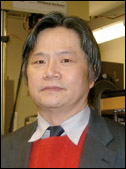ABSTRACT
From October 2003 to April 2008, a systemic reform of the mechanical engineering program at The City College of New York was undertaken with the goal of incorporating emerging technologies (such as nanotechnology, biotechnology, Micro-Electro-Mechanical Systems (MEMS), intelligent systems) and new teaching methodologies (such as project based learning, hands-on laboratory experiences, inquiry based learning, home experiments) into the curriculum. This reform activity was supported by NSF and affected all the courses taught by the Department. Almost all faculty participated in the effort. In this paper, we describe the modifications introduced in four courses of the curriculum, namely, mechatronics, mechanics of materials, heat transfer and system modeling, analysis and control. The modifications consisted both of topics related to emerging technologies and new teaching methodologies. Results of assessment conducted to ascertain the effect of the changes are presented. For example student opinions about course outcomes before and after the modifications were surveyed for the four courses discussed above. Based on the limited assessment data available thus far, it appears that students’ confidence and overall academic performance has improved in some courses following the reform. It is the authors’ opinion that these will see further improvement in coming years as the specifics of the reform elements are refined.
Click for Full-Text PDF Article.




